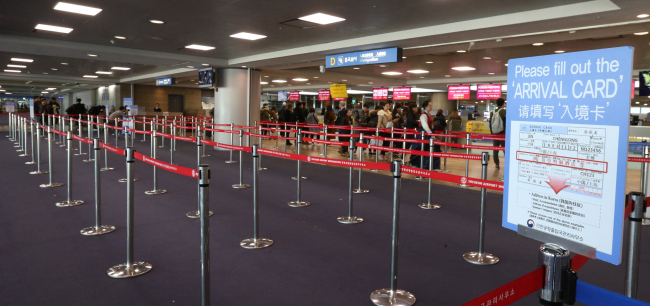Following the joint Korea-US decision to deploy the THAAD battery in Korea last July, a de facto Hallyu ban has been in place in China. Following is the second article in a three-part series that examines the impact of the unofficial Hallyu ban on the Korean entertainment and tourism industries. --Ed.With China clamping down on Korea-bound tourism -- widely suspected as retaliation for the upcoming Seoul-Washington deployment of the US missile defense system here -- the tourism industry is searching for ways to cope with the potentially substantial decrease in the number of incoming Chinese tourists.
On Tuesday, Korea said it began the assembly of the Terminal High Altitude Area Defense system here. The announcement coincided with the news that the Chinese government has rejected Korean carriers’ applications to operate chartered flights between the two countries, with Beijing expected to also limit scheduled flights.
The measures follow China telling its major travel agencies last month not to sell tours to Korea after March 15, strongly indicating Beijing’s anger at what it called “a decision infringing upon its strategic interest” is deepening over time.
China’s reaction, while expected, spells trouble for Korean authorities’ plan to attract 20 million foreign tourists this year. According to the Korea Tourism Organization, nearly half -- 8.06 million -- of 17 million tourists who visited Korea last year are Chinese.

Caption: Lines at the Incheon International Airport immigrations desk are nearly empty on Friday. (Yonhap)
With reports of Chinese tourists cancelling reservations pouring in, the KTO was reluctant to comment on exactly what kind of damage the Chinese ban has inflicted upon local tourism.
“We’re receiving daily reports on the matter. But we’re refraining from commenting on the matter, as the information may be abused by the Chinese,” said an official from the KTO. “We’re in the process of fine-tuning a measure with government officials.”
While the authorities remain quiet, the magnitude of the impact is likely to be considerable. The Korean resort island of Jeju, one of the biggest tourism spots in the country, held an emergency meeting Monday to discuss measures against China’s tourism ban.
It has been reported that as a result of Beijing‘s action last week, 420 group tourists had cancelled their reservations to travel to Jeju Island.
According to Jeju government, major tourism companies in China have decided to discontinue visa and tourism-related work related to Korea and have removed Korea-related programs. It is expecting a slump in the island‘s tourism after March 15 due to mass cancellation by the Chinese.
“I will meet with the deputy prime minister and strategy and finance minister (Yoo Il-ho) this week and next week and establish a communication line with the ministry-affiliated response team for Chinese affairs,” said Jeju Gov. Won Hee-ryong, expressing regret for China using tourism as a retaliatory measure for its political and military agenda.
An official from the Korea Association of Travel Agents said mass cancellation on a nationwide scale has yet to take place, saying that it will take some time for the Chinese measures to fully take effect. “The real issue is what will happen from now on,” he added.
The official noted that Korean travel agencies planning trips to China have also raised concerns about visiting the country, when Beijing appears to grow more hostile toward Korea over THAAD.
“Some (of the agencies) wonder if it’s safe to go to China in this situation, specifically concerning the safety of their clients. I don’t think it is likely they (Korean tourists) will actually be in danger, but they must be concerned,” he said.
Beijing has already slapped a ban on the circulation of Korean pop culture content, with popular Korean music and dramas being available mostly via illegal streaming sites.
The head of the entertainment agency King Kong by Starship, which represents Korean actor Kim Beom, told a local media outlet that his company “hasn’t earned a penny” since the THAAD row began last year.
As the impact of China’s actions do not stop at the tourism and pop culture industries, but span several business sectors, the Korean government has been scrambling for ways to aid affected companies. The Ministry of Trade, Industry and Energy announced Tuesday it will offer a loan of up to 1 billion won ($866,000) over five years to smaller companies facing financial problems due to China’s trade restrictions.
Some observers say that the fallout from the China ban stems from the tourism industry‘s over reliance on the most populous country in the world.
“Regional governments can’t help (but focus on China), as it guarantees immediate payoff. So when something like this happens, they cannot deal with them,” said an official from the KTO. “Maybe this could be an opportunity for us, as we can learn not to put all our eggs in one basket.”
For the long term, the KTO is looking to diversify the country’s tourism market. Earlier this year, it announced a goal to attract 3.6 million tourists from Southeast Asia, 2.5 million from the Americas and Europe by the end of this year. It is also eyeing more tourists from the Middle East, Russia, and especially Japan, which had been the largest market for Korean tourism before the influx of Chinese travelers.
Another measure involves injecting money into developing local tourism targeting Koreans, officials said, pointing out that Japan managed to minimize negative impact on its tourism during their own row with China thanks to a huge domestic market.
“China is so big, so our plans would not be able to cover 100 percent of the impact brought forth by its measures. We have to look at it from a long term perspective. I think diversifying the market has already had an effect; about half of the 4 million increase in tourists last year were from countries other than China,” said a KTO official.
By Yoon Min-sik
(minsikyoon@heraldcorp.com)






